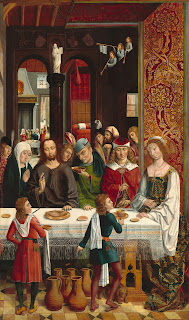One of the challenges of reading Paul's letters are that we often don't know what they are written in response to. It is like listening to one side of a phone conversation without knowing what the other person is saying. You can extrapolate something of what the unheard person said just by how the person on this side responds, but you can't know for sure. That is what is happening with the second part of 2 Corinthians. In 2 Corinthians 11 Paul seems to be responding to people who has challenged his authority as a prophet. They seem to have said that Paul writes boldly, but speaks weakly. They seem to think that he should have let the people of Corinth support him financially, but instead he supported himself. One of their biggest criticisms, and the one he spends the most time responding to, seems to have been, "if you are a prophet of God, why have so many terrible things happened to you?"
Starting at 2 Corinthians 11:23 Paul says, "Are they (i.e. his detractors) ministers of Christ? (I speak as a fool) "I am more, in labors more abundant, in stripes above measure, in prisons more frequent, in deaths, oft." Then he goes into a long list of all the trials he has suffered in his 14 year ministry. To a modern reader, his recitation sound a bit self-righteous. It sounds like he is saying, "You think you have sacrificed a lot for the gospel. Well, I have sacrificed way more." The important thing here is to pay attention to his little asides where he says he is speaking as a "fool." He is admitting that what he is giving as evidence of his authority as an apostle will sound ridiculous to them. But wait. Isn't sacrificing and suffering for the Kingdom of God a mark of extreme righteousness? Wouldn't he expect his listeners to be impressed with the long list of what he was willing to undergo in his quest to spread Christianity? Well, yes and no.
We need to remember historical context here. So here is a trick question. Who was the first Christian martyr? You might think, Steven, but really the first Christian martyr was Christ. I bring this up because the idea of someone whom God favors suffering was a new and unfamiliar idea in the ancient world. In both ancient Judaism and in Greek culture, you can tell if someone is favored of God because of their wealth and prosperity. Jesus was the first to turn that on its head and, as an agent of God, suffer. Yes, there was the talk of the Suffering Servant in Isaiah 53, but in day to day life in the ancient world god's favor=prosperity. If you look at Greek mythology, the heroes only fell when they angered a god. Odysseus had to wander for ten years because he angered Poseidon. Heracles had to perform his 10 labors because he angered Hera. On the Jewish side, Sampson was captured by Delilah because he broke his vow to God. Moses was prevented from entering the promised land because he smote the rock to get water without giving credit to God. The fact that Paul had endured so many trials would have been evidence to some of this mindset in the ancient world that he was not in good standing with God.
Of course, Paul, in this chapter, it turning this on its head, and by doing so, I believe, helps originate the Christian ideal of suffering as a sign of righteousness. Of course, it really originated with Jesus, but I think Paul brought it to the common believer. At the time when Paul was a missionary, the idea of the righteous suffering was new and strange. A few decades later when Christians began to be the target of Nero and experienced widespread persecution and mass murder in gladiatorial arenas and elsewhere, this idea of suffering as a sign of righteousness took root. Perhaps these chapters in 2 Corinthians were even the foundation for the later glorification of Christian martyrs and even the establishment of the idea of "Saints." Early Christians who underwent persecution certainly would have been a comforted by Paul's example of enduring trials with faith. It would have given them a way to say, "I have suffered for Christ, as Christ suffered for me. My suffering has value and validates my righteousness instead of negating it."
 |
| Ruins of Ancient Corinth |





